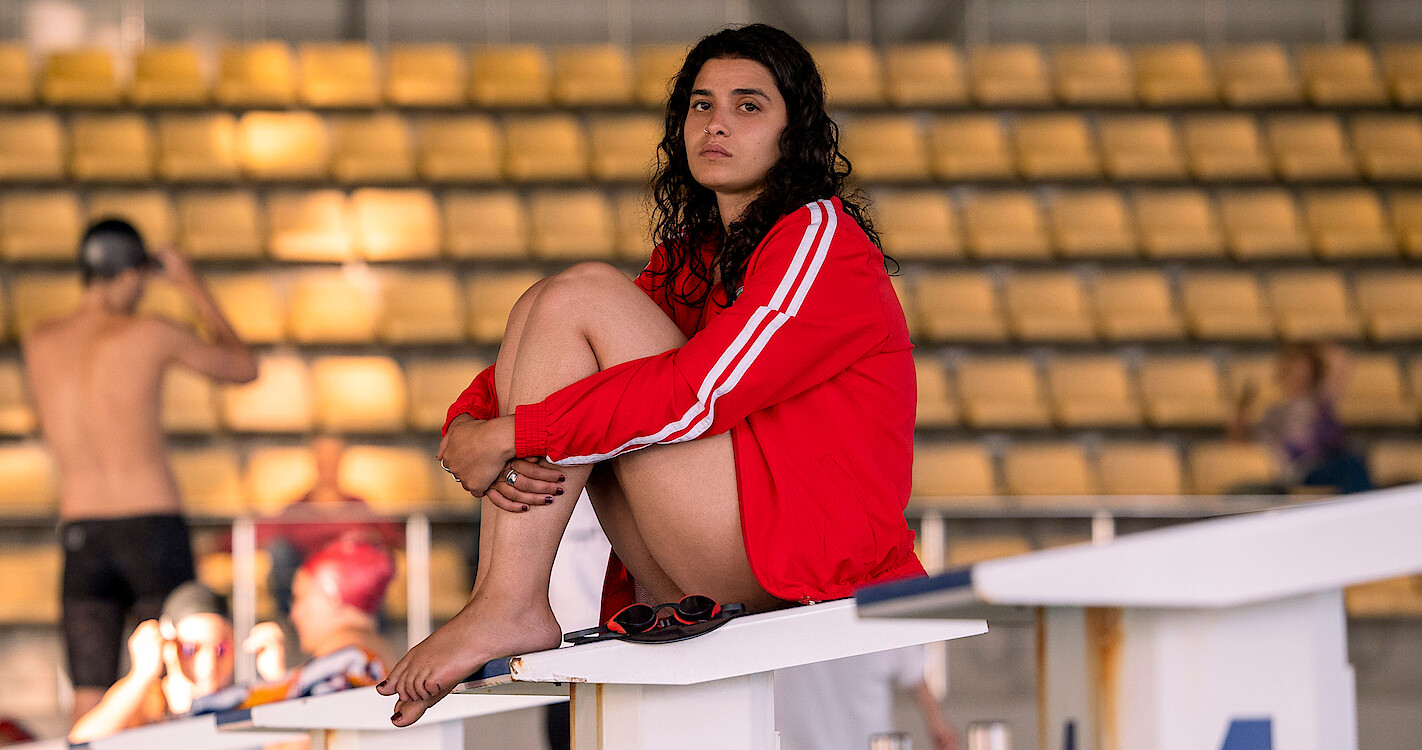Shaza Hafez reviews the biographical sports drama by Sally El-Hosaini – an unconventional journey of the Hollywood hero.
The Swimmers tells the true story of two Syrian refugee sisters, Yusra and Sara Mardini, who flee their war-torn home to Germany in 2015, seeking asylum. A common and valid critique received by the film noted its ‘never-give-up’ tone and ‘feel-good’ ending: after surmounting the most unimaginable conditions – the hero makes it big at the Olympics! Critics, however, don’t win medals.

The ordinary directorial choices made to tell this extraordinary story makes it more accessible, and less unfathomable, for the general public. Don’t these girls deserve their heroism depicted in classic Hollywood style, even if it’s beyond the typical narratives of such movies? Despite the looming threat of deportation, The Swimmers goes to show that the refugee story need not always lead to a morbid pity-party ending. Why not depict them in a new way? The film does an uncommonly good job at disrupting the polarised ‘victim or perpetrator’ binary kind of refugee representation seen in the media.
The opening scene shows a local pool in the once beautiful damascene suburb of Darayya. The characters aren’t stereotyped as radical religious militants or extreme conservatives: the women are in bikinis, and the two sisters are later seen drinking and partying with no repercussions. Seeing a Middle Eastern country depicted that way on screen is refreshing, as they always tend to be heavily filtered with yellow tones. Yusra Mardini herself commented on how people were often shocked when she would tell them she was a refugee from Syria, as they found her very pretty.
On the other hand, Sally El-Hosaini does not shy away from portraying a raw Middle East, and avoids idealising its society. The same goes for her directorial debut, My Brother the Devil (2012). In The Swimmers, a run-in with soldiers on a bus progresses into a nauseous act of sexual harassment. When a shooting breaks out and saves them from the soldier’s molesting, the scene feels slightly overdone. Nevertheless, it is still an important reflection of how relatively bigger issues in the Middle East, such as war, leave matters like sexual violence untended to. El-Hosaini reveals the cycle of horror that some of these nations are trapped in.

At its core, the film remains a sports drama, despite it being overshadowed by the refugee experience theme for a non-desensitised viewer. It begins with the two sisters in a pool, and ends with one of them competing at the 2016 Rio Olympics. A montage of Yusra working out at the refugee camp seals the deal. Their story mirrors Venus and Serena’s in King Richard (2021) – their father Ezzat also coaches them intensely after failing to make his own dream come true. Many labelled the transition between the first and second part of the film a ‘jarring tonal clash’ –the first half focuses on their treacherous journey to Berlin, while the second one feels like a success story. Yet, there is nuance to this. Yes, they are fleeing their country and seeking refuge. Yes, they are also girls with their own goals and dreams, war is not all that defines them.
Of course, the defining moment of the film demands a mention. When the dinghy they cross the Aegean sea on begins to sink , the two sisters remarkably jump in the water and swim alongside it, dragging the other refugees all the way to Greek shores. This event is what initially brought the story of Yusra Mardini to light. When it comes to editing, this scene may be one of the few in film history that truly makes the slow motion cliché feel tolerable, as opposed to overdramatized. However, this incredible act of bravery wasn’t truly done justice on screen. Its execution felt incomplete, and rendered the viewer underwhelmed when it was cut short. It is unfortunate to see such an integral part of their story trivialised and limited to a few minutes. Other harrowing details of the Syrian Civil War experience were also brushed over, such as their father Ezzat Mardini’s torture at the hands of the paramilitaries.

Many people did not know about Yusra’s sister Sara until the release of the film. The latter is currently on trial for aiding and rescuing refugees who are trying to make it to safety. She was arrested along with fellow volunteer Sean Binder on charges of assisting illegal immigration, a blatant criminalisation of humanitarian solidarity. Media attention favours ‘conflict-free’ activism: making little speeches at the UN, or competing at the Olympics to prove the refugee’s life as worthy of saving. The father tells his daughters at the beginning of the film that Sara’s the bold one, unafraid to get her hands dirty, while Yusra’s the one with the discipline to achieve great things. Throughout the film the two sisters’ paths deviate as their journey unravels.
We often hear stories about Syrian refugees, but putting names to these faceless millions can make it easier for people to empathise. Despite slightly overwhelming the audience with its many metaphors and a condensed plot line, The Swimmers remains one of the strongest films made in the past few years to address the refugee crisis, and it is encouraging to finally see these untold stories portrayed on screen.
The Swimmers is currently available to stream on Netflix. Watch the trailer here:




